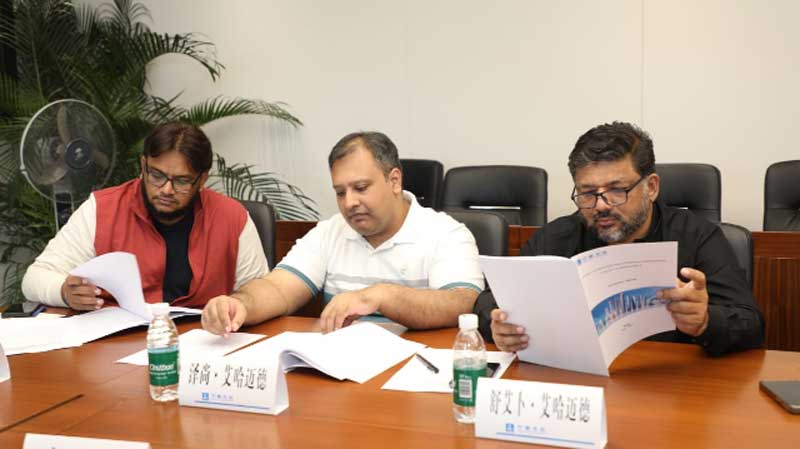

As Pakistan witnesses rapid infrastructural development through the China-Pakistan Economic Corridor and other bilateral projects, the need for a highly skilled and efficient workforce is more important than ever. The China State Construction Engineering Corporation (CSCEC), a key player in these transformational projects, has recognized the importance of knowledge transfer and skills development in promoting local talent. By investing in training programs for Pakistani engineers, construction professionals, and workers, CSCEC contributes not only to Pakistan’s infrastructure growth, but also to the long-term development of the country’s human capital.
During the visit of the Pakistani media delegation to CSCEC, the company’s initiatives in the field of training and development for Pakistani professionals were explored. The focus was on how these programs could enhance the skills of local engineers, managers and workers, while also contributing to Pakistan’s overall economic and industrial progress. With a shared vision for sustainable development, these efforts reflect CEC’s commitment to enhancing Pakistan’s construction and engineering capabilities, and ensuring that local talent is empowered to meet the country’s growing infrastructure requirements.
The growing need for skilled professionals in Pakistan’s infrastructure boom
Pakistan’s urban landscape is undergoing a major transformation, thanks in large part to the China-Pakistan Economic Corridor and other large-scale infrastructure projects. From highways and railways to power plants and industrial parks, Pakistan’s economic development is closely linked to the success of these initiatives. With such a wide range of construction projects underway, there is a strong demand for skilled professionals who can effectively manage and execute these complex endeavors.
However, like many developing countries, Pakistan faces challenges in meeting this demand. There is a shortage of qualified engineers, construction managers and skilled workers with the technical expertise needed for high-level construction and infrastructure projects. This gap threatens to slow progress and reduce the quality of the work being done.
Recognizing this need, CSCEC has stepped forward with a range of training programs and development opportunities designed to improve the skills of Pakistani professionals and workers. These initiatives not only ensure that Pakistan has a workforce capable of supporting its infrastructure growth, but also pave the way for greater self-reliance in the long term.
Knowledge transfer: a fundamental pillar of CSCEC’s strategy
Knowledge transfer – the exchange of expertise, technology and best practices between organizations and countries – is at the heart of CSCEC’s training efforts in Pakistan. By promoting knowledge transfer, CSCEC ensures that Pakistani professionals acquire the necessary skills to independently manage and implement large-scale projects.
The approach adopted by the Chinese construction company is multi-faceted, and includes a mix of on-the-job training, formal education programs, and collaborative projects that enable Pakistani engineers and construction professionals to work side by side with their Chinese counterparts. This hands-on experience provides valuable exposure to modern construction techniques, project management strategies, and innovative technologies used in large-scale infrastructure development.
On-the-job training programs
One of the most effective forms of knowledge transfer used by CSCEC is on-the-job training. Pakistani engineers and construction professionals working on CPEC and other CPEC-led projects are collaborating with Chinese experts and gaining practical experience in cutting-edge construction techniques and techniques.
For example, during the construction of the Lahore Orange Line metro line, a Chinese construction engineering company implemented a rigorous on-the-job training program for Pakistani engineers and workers. This initiative allowed local professionals to work side by side with Chinese engineers, learning about advanced construction methods such as prefabrication, modular construction techniques, and the use of sustainable materials. Through this approach, Pakistani engineers have gained first-hand experience in applying international standards and methodologies, qualifying them to assume leadership roles in future infrastructure projects within and outside Pakistan.
Technical workshops and seminars
In addition to on-the-job training, CSCEC frequently organizes technical workshops and seminars to build the technical capacity of Pakistani professionals. These workshops cover topics including project management, civil engineering best practices, safety standards and environmental sustainability.
CSCEC invites industry experts, academics and senior engineers from both China and Pakistan to lead these sessions, creating an interactive learning environment where Pakistani professionals can deepen their knowledge and engage in meaningful discussions on the latest developments in the field of construction and engineering. By promoting the exchange of ideas and experiences, these workshops foster a culture of continuous learning and innovation within the construction sector in Pakistan.
One notable example is the series of technical workshops conducted during the construction of the Multan-Sukur Expressway, a major project of the China-Pakistan Economic Corridor. These sessions focused on modern road construction techniques, the application of intelligent transportation systems, and best practices to ensure safety and quality in large-scale infrastructure projects.
Formal educational programs and scholarships
In addition to providing on-the-job training and workshops, CSCEC has also invested in formal education and scholarship programs aimed at developing the next generation of engineers and construction professionals in Pakistan. These programs allow Pakistani students and young professionals to pursue higher education and specialized training in fields related to construction, civil engineering and project management.
CSCEC has established partnerships with universities and technical institutions in both Pakistan and China to facilitate these educational opportunities. Pakistani students are often offered scholarships to pursue engineering degrees at leading Chinese universities, where they can access world-class facilities, cutting-edge research, and mentorship from experienced professors. Upon completion of their studies, these students often join CSCEC projects in Pakistan, applying their newly acquired knowledge and skills in real-world environments. This creates a continuous cycle of talent development, ensuring that Pakistan’s construction industry remains equipped with the expertise needed to drive infrastructure growth.
Capacity building of construction workers
While CSCEC’s training initiatives often focus on engineers and project managers, the company also recognizes the importance of improving the skills of construction workers and technicians. Skilled labor is essential for the successful implementation of large-scale infrastructure projects, and CSCEC has made great efforts to provide vocational training to workers in Pakistan.
These training programs focus on practical skills, such as bricklaying, welding, carpentry, and machine operation. CSCEC provides classroom education and hands-on training to ensure workers are well-versed in modern construction techniques and safety protocols.
During the construction of the Carrot Hydropower Project, CSCEC established an on-site vocational training center offering courses in heavy machinery operation, electrical work, and mechanical engineering. This initiative has improved the quality of work on the project and has provided Pakistani workers with valuable skills that will enhance their employability in future projects.
Empowering Pakistan’s workforce for the future
The impact of CSCEC’s training and development programs extends beyond the direct needs of individual projects. By investing in the professional growth of Pakistani engineers, construction managers and workers, CSCEC is empowering the local workforce to take charge of Pakistan’s future infrastructure development.
As Pakistani professionals gain more proficiency in advanced construction techniques, project management, and modern technologies, they will be better placed to lead major infrastructure projects independently. This self-sufficiency is crucial to Pakistan’s long-term development, because it reduces dependence on foreign expertise and enables the country to manage infrastructure needs independently.
Furthermore, these training programs contribute to broader economic development by creating employment opportunities, increasing productivity, and enhancing the competitiveness of the construction industry in Pakistan. As more skilled professionals enter the labor market, Pakistan will attract greater foreign investment and undertake more ambitious infrastructure projects.
CSCEC’s training and development initiatives for Pakistani professionals are a testimony to the company’s commitment to long-term cooperation and capacity building in Pakistan. By focusing on knowledge transfer, skills development and formal education, CSCEC plays a key role in equipping Pakistan’s workforce with the expertise needed to support the country’s infrastructure ambitions. As Pakistan continues to urbanize and expand its industrial base, the demand for skilled engineers, construction managers and laborers will increase. The efforts of CEC to develop local talent will ensure that Pakistan remains well-equipped to meet this demand, paving the way for a more prosperous and self-reliant future. Through continued cooperation, both China and Pakistan will continue to benefit from mutual exchange of knowledge, experience and innovation in the construction and engineering sectors.

